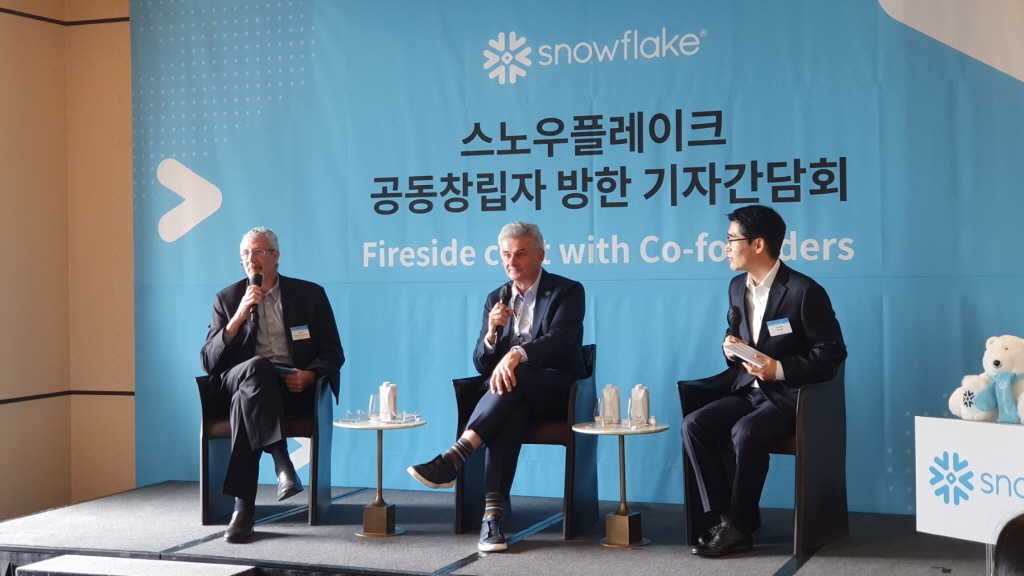스노우플레이크(Snowflake)의 공동창립자인 베누아 다쥬빌(Benoit Dageville) 제품 부문 사장과 티에리 크루아네스(Thierry Cruanes) 전 최고기술책임자가 최기영 한국지사장이 함께 진행한 기자 간담회에서 스노우플레이크는 AI 기술을 통합해 복잡한 데이터 분석을 간편화하고, 더 많은 기업들이 데이터 활용 장벽을 극복하도록 돕고 있다고 밝혔다.
NLP 활용 더 많은 기업 데이터 활용 장벽 극복
혁신적 데이터 마켓플레이스 다양한 콘텐츠 제공
“스노우플레이크(Snowflake)의 데이터 클라우드는 AI를 통해 정형 데이터와 비정형 데이터를 결합해 더욱 정밀한 분석 결과를 도출할 수 있다. 이는 정확성을 특히 중시하는 기업들에게 큰 호응을 얻고 있다”
스노우플레이크(Snowflake)는 25일 포시즌스 호텔에서 기자간담회를 갖고 스노우플레이크의 비즈니스를 소개했다.
이번 행사에는 스노우플레이크의 공동창립자인 베누아 다쥬빌(Benoit Dageville) 제품 부문 사장과 티에리 크루아네스(Thierry Cruanes) 전 최고기술책임자가 최기영 한국지사장과 함께 참석해 질의 응답을 진행했다.
창업자들은 이번 한국 방문을 통해 스노우플레이크의 기술적 비전과 글로벌 성공 사례를 나누며 한국 주요 기업들과 협력을 논의했다며 한국은 기술 발전의 중심지이며, 매우 흥미로운 시장이라고 말했다.
스노우플레이크 창업 당시, 해결하고자 했던 주요 과제와 관련해서는 2012년 당시 스노우플레이크의 창업자들은 빅데이터와 클라우드 기술의 한계를 극복하고자 했다며 베누아 다쥬빌 사장은 “당시 데이터 플랫폼은 느리고 비효율적이었으며, 클라우드 기술은 이를 혁신적으로 바꿀 가능성이 있었다. 우리는 클라우드의 탄력성과 확장성을 활용해 정형 데이터와 비정형 데이터를 통합할 수 있는 플랫폼을 개발했다”고 밝혔다.
스노우플레이크가 데이터 분석 시장에서 가져온 혁신과 관련해서는 스노우플레이크는 클라우드 기반의 컴퓨팅 자원 배정 및 반환 기능을 통해 데이터 분석의 효율성을 크게 향상시켰다며 AI 기술을 통합해 복잡한 데이터 분석을 간편화하고 모든 조직이 데이터 민주화를 실현할 수 있도록 했다고 답변했다.
AI 발전에 맞춰 어떤 계획을 가지고 있는지와 관련해서는 스노우플레이크는 AI와 데이터의 결합을 통해 고객들에게 더욱 혁신적인 솔루션을 제공할 계획이라며 AI의 발전 속도는 매우 빠르며, 데이터 플랫폼을 통해 새로운 가치를 창출하는 방법을 계속 탐구할 것이라고 말했다.
Q&A에 앞서 스노우플레이크의 비즈니스를 소개한 최기영 지사장은 스노우플레이크는 클라우드 중심의 데이터 관리를 통해 기업들이 데이터 자산을 효과적으로 활용할 수 있도록 돕고 있다고 언급했다.
특히 다양한 데이터 소스를 오픈 테이블 형식으로 활용 가능하게 하는 기술을 도입하며 데이터 간의 상호 운용성을 높이고 있다며 이를 통해 기업들은 기존 정형 데이터뿐만 아니라 비정형 데이터를 효과적으로 결합해 새로운 비즈니스 인사이트를 도출할 수 있게 됐다고 자신감을 보였다.
최기영 지사장은 AI 기술의 발전은 데이터 소비 방식에도 혁신을 가져왔다며 자연어 처리 기술(NLP)을 활용해 데이터 분석 과정에서의 접근성을 높였으며, 이를 통해 더 많은 기업이 데이터 활용의 장벽을 극복하고 있다고 밝혔다.
이전에는 SQL 등의 전문 지식이 요구되던 작업들이 이제는 자연어 인터페이스로 가능해지며, AI 기반 데이터 소비가 더욱 확대되고 있다.
이러한 발전은 단순히 기술적 편리성을 넘어 기업의 비즈니스 가치 창출로 연결된다.
최기영 지사장은 스노우플레이크의 데이터 클라우드는 유연성과 확장성이 뛰어난 아키텍처를 기반으로 정형 및 비정형 데이터를 통합하며, 기업들이 AI를 효과적으로 활용할 수 있는 플랫폼을 제공한다고 말했다.
이어 AI를 통해 정형 데이터와 비정형 데이터를 결합해 더욱 정밀한 분석 결과를 도출할 수 있다며 이는 특히 정확성을 중시하는 기업들에게 큰 호응을 얻고 있다고 말했다.
최기영 지사장은 “스노우플레이크는 멀티 클라우드를 지원하며 데이터 저장소 및 컴퓨팅 자원을 효율적으로 관리하는 동시에, 혁신적인 데이터 마켓플레이스를 통해 다양한 콘텐츠를 제공하고 있다”며 “이러한 노력은 AI 시대의 데이터 활용 가능성을 넓히고, 기업들이 데이터 기반의 의사결정을 통해 경쟁력을 확보할 수 있도록 돕고 있다”고 밝혔다.

.jpg)